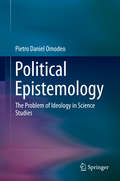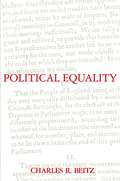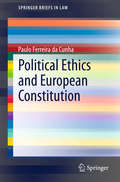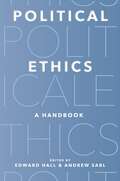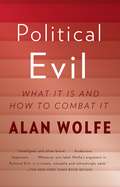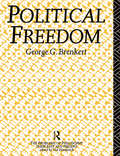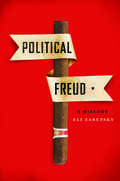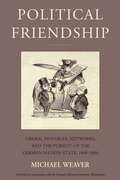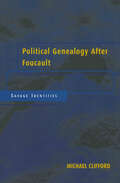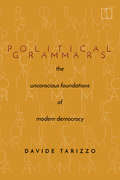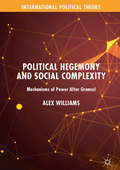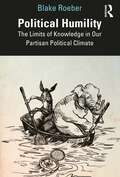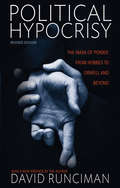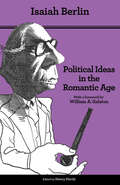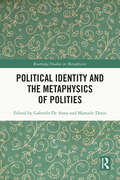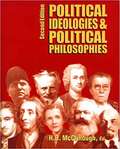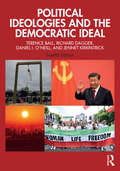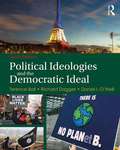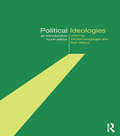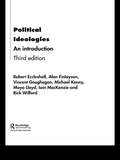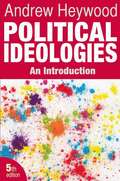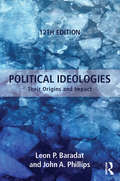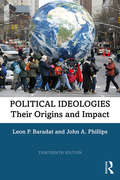- Table View
- List View
Political Epistemology: The Problem of Ideology in Science Studies
by Pietro Daniel OmodeoThis book is an investigation of the ideological dimensions of the disciplinary discourses on science in line with the scholarly tradition of historical epistemology. It offers a programmatic treatment of the political-epistemological problematic along three entangled lines of inquiry: socio-historical, epistemological and historiographical. The book aims for a meta-level integration of the existing scholarship on the social and cultural history of science in order to consider the ways in which struggles for hegemony have constantly informed scientific discourses. This problematic is of primary relevance for scholars in Science Studies, philosophers, historians and sociologists of science, but would also be relevant for anybody interested in scientific culture and political theory.
Political Equality: An Essay in Democratic Theory
by Charles R. BeitzThe description for this book, Political Equality: An Essay in Democratic Theory, will be forthcoming.
Political Ethics and European Constitution
by Paulo Ferreira da CunhaIs the dream of EU endangered? This book reviews classic and modern values and virtues, and uses them in order to rethink Europe's present politics and its future. The idea of the Republic was born with the political ethics of ancient Greece. The current international crisis obliges Europe to face the mirror of truth: What has become of the European Idea and how fares the European Constitution? It has been a long road from the Greek Politeia to the present lack of values and financial monomania in Europe, who seems to have lost any harmony between the spirit, the soul and the body of her Constitution: the will and values of the people (material constitution), the text of the Lisbon Treaty (formal constitution) and its current political interpretation and action (real constitution), making Europe a two-tier or three-tier club, far from the dream of the founding fathers. Without republican values and virtues, and failing to uphold the European social model, the European Union would devolve into moral, social and democratic bankruptcy.
Political Ethics: A Handbook
by Edward Hall and Andrew SablA comprehensive introduction to contemporary political ethicsWhat is the relationship between politics and morality? May politicians bend moral constraints in the name of political necessity? Is it always wrong for leaders to lie? How much political compromise is too much (or too little)? In Political Ethics, some of the world’s leading thinkers in politics, philosophy, and related fields offer a comprehensive and accessible introduction to key issues in this rapidly growing area of political theory.In a series of original essays, the contributors examine a range of urgent political problems: lies and deception, compromise and refusal to compromise, the meaning and limits of political integrity, representation and failures of representation, good and bad democratic leadership, the virtues and excesses of partisanship, administrative ethics, political corruption, whistleblowing, legitimate and illegitimate claims of political emergency, and lobbying. What emerges are realistic but demanding ethical standards—and a clear-eyed understanding of the ethical challenges of political life in the twenty-first century.With contributions by Richard Bellamy, Alin Fumurescu, Edward Hall, Suzanne Dovi and Jesse McCain, Eric Beerbohm, Russell Muirhead and Nancy Rosenblum, Joseph Heath, Elizabeth David-Barrett and Mark Philp, Michele Bocchiola and Emanuela Ceva, Nomi Lazar, Phil Parvin, and Andrew Sabl.
Political Evil: What It Is and How to Combat It
by Alan WolfeA timely, eye-opening examination of political evil, a concept widely misunderstood and desperately in need of clarification in our ever more chaotic world.In an age of genocide, terrorism, ethnic cleansing, and torture, evil threatens us in ways radically different from tsunamis and financial panics. Nature unleashes its wrath and people rush to help the victims. Evil shows its face and we are paralyzed over how to respond.It was not always this way. During the twentieth century, thinkers as diverse as Hannah Arendt, Reinhold Niebuhr, Arthur Koestler, and George Orwell made evil central to everything they wrote. Acclaimed political scientist Alan Wolfe argues that in an age of partisan blame-assigning, therapeutic excuse-making, and theological question-dodging, we need to get serious about the problem of evil once again. While there will always be something incomprehensible about evil, we are very much capable of understanding and combating the use of evil means to obtain political ends. Diplomats and politicians with their own agendas ignore this side of evil to grim and often tragic effect. These movers and shakers apply the concept of general evil, seemingly inconquerable, inviting only violence and despair to situations that are local in nature. Looking at examples of political evil around the globe--in the Middle East, Darfur, the Balkans, and at home in the West--Wolfe shows us how seemingly small distinctions can make an immense difference in international response. And he makes clear that much-needed change can be initiated with a shift in how we talk and think about political evil.International shame in the years following the Rwandan genocide--after the world failed to recognize it as such--led to a large-scale campaign against genocide in Darfur. Except, Wolfe argues, in Darfur it wasn't genocide: it was civil war. We see--surprisingly, and powerfully--that labeling the conflict incorrectly had disastrous effects, even extending the violence as soldiers waited for seemingly inevitable Western intervention. When, on the other hand, Western leaders compared Serbian president and infamous ethnic cleanser Slobodan Milosevic to Hitler, they failed to recognize that exterminating people and seeking to take over their land are both evil but they are evil in different ways; misguided Western intervention in the Balkans eventually brought ethnic cleansing to an end, but only by allowing it to run its course.At once impassioned and pragmatic, Political Evil sheds essential light on the creation of policy and on a concrete path to a more practicable and just future.From the Hardcover edition.
Political Freedom (Problems of Philosophy #49)
by George G. BrenkertThis book examines the underlying theoretical issues concerning the nature of political freedom. Arguing that most previous discussions of such freedom have been too narrowly focused, it explores both conservativism from Edmund Burke to its present resurgence, the radical tradition of Karl Marx, as well as the orthodox liberal model of freedom of John Locke, John Stuart Mill and Isaiah Berlin. Political Freedom argues that these three accounts of political freedom - conservative, liberal and radical - all have internal weaknesses which render them unsatisfactory.In the second part of the book George Brenkert develops an alternative theory of political freedom. Using the guiding concept of empowerment, his model explores individual rights, democratic participation in government and workplace, and the need to provide the material and educational resources to allow individuals to effectively exercise their rights to self-determination. It is a clear and bold attack on the view that there is no link between freedom and power.
Political Freud: A History
by Eli ZaretskyIn this masterful history, Eli Zaretsky reveals the power of Freudian thought to illuminate the great political conflicts of the twentieth century. Developing an original concept of "political Freudianism," he shows how twentieth-century radicals, activists, and intellectuals used psychoanalytic ideas to probe consumer capitalism, racial violence, anti-Semitism, and patriarchy. He also underscores the continuing influence and critical potential of those ideas in the transformed landscape of the present. Zaretsky's conception of political Freudianism unites the two overarching themes of the last century—totalitarianism and consumerism—in a single framework. He finds that theories of mass psychology and the unconscious were central to the study of fascism and the Holocaust; to African American radical thought, particularly the struggle to overcome the legacy of slavery; to the rebellions of the 1960s; and to the feminism and gay liberation movements of the 1970s. Nor did the influence of political Freud end when the era of Freud bashing began. Rather, Zaretsky proves that political Freudianism is alive today in cultural studies, the study of memory, theories of trauma, postcolonial thought, film, media and computer studies, evolutionary theory and even economics.
Political Friendship: Liberal Notables, Networks, and the Pursuit of the German Nation State, 1848-1866 (Studies in German History #29)
by Michael WeaverBetween periods of revolution, state repression, and war across Central and Western Europe from the 1840s through the 1860s, German liberals practiced politics beyond the more well-defined realms of voluntary associations, state legislatures, and burgeoning political parties. Political Friendship approaches 19th century German history’s trajectory to unification through the lens of academics, journalists, and artists who formed close personal relationships with one another and with powerful state leaders. Michael Weaver argues that German liberals thought with their friends by demonstrating the previously neglected aspects of political friendship were central to German political culture.
Political Genealogy After Foucault: Savage Identities
by Michael CliffordCombining the most powerful elements of Foucault's theories, Clifford produces a methodology for cultural and political critique called "political genealogy" to explore the genesis of modern political identity. At the core of American identity, Clifford argues, is the ideal of the "Savage Noble," a hybrid that married the Native American "savage" with the "civilized" European male. This complex icon animates modern politics, and has shaped our understandings of rights, freedom, and power.
Political Grammars: The Unconscious Foundations of Modern Democracy (Square One: First-Order Questions in the Humanities)
by Davide TarizzoDo we need to be a "people," populus, in order to embrace democracy and live together in peace? If so, what is a populus? Is it by definition a nation? What exactly do we mean by nationality? In this book, Davide Tarizzo takes up the problem of modern democratic, liberal peoples—how to define them, how to explain their invariance over time, and how to differentiate one people from another. Specifically, Tarizzo proposes that Jacques Lacan's theory of the subject enables us to clearly distinguish between the notion of personal identity and the notion of subjectivity, and that this very distinction is critical to understanding the nature of nations whose sense of nationhood does not rest on any self-evident identity or pre-existent cultural or ethnic homogeneity between individuals. Developing an argument about the birth and rise of modern peoples that draws on the American Declaration of Independence of 1776 and the French Declaration of the Rights of Man and the Citizen of 1789 as examples, Tarizzo introduces the concept of "political grammar"—a phrase that denotes the conditions of political subjectification that enable the enunciation of an emergent "we." Democracy, Tarizzo argues, flourishes when the opening between subjectivity and identity is maintained. And in fact, as he compellingly demonstrates, depending on the political grammar at work, democracy can be productively perceived as a process of never-ending recovery from a lack of clear national identity.
Political Hegemony and Social Complexity: Mechanisms of Power After Gramsci (International Political Theory)
by Alex WilliamsHow can we understand power in a world of ever-growing complexity? This book proposes that we can do so by rethinking the theory and practice of political hegemony through the resources of complexity theory. Taking Gramsci’s understanding of hegemony as its starting point, the book argues that the intricacies of contemporary power can be mapped by applying concepts drawn from complexity theory, such as emergence, self-organisation, metastability, and generative entrenchment. It develops an original account of social complexity, drawing upon critical realist sociology, analytic philosophy of science, Marxist and continental philosophies, and neoliberal and anarchist thought. It then draws out the elements of Gramscian hegemony that already align with complexity concepts, such as the balance of forces, common sense, and the historic bloc. On this basis, the book sets out the different dimensions of complex hegemonic power before using this theory to interpret the nature of the power of neoliberalism since 2008.
Political Humility: The Limits of Knowledge in Our Partisan Political Climate
by Blake RoeberThis book aims to change the way we think about politics, talk about politics, and vote.It does this in two ways. First, it shows it’s impossible for a Republican, Democrat, or voter in any political party to possess a significant level of knowledge of facts that would help their party secure or maintain political power. It calls this knowledge “political knowledge” and shows how unfeasible it is for anyone to have it. Second, it explains how we might best be politically engaged, given that we have virtually no political knowledge.To argue that it is impossible for any person to possess a significant amount of political knowledge, the book depends on two empirically verified facts. The first is that we have virtually no means of acquiring political information except by believing what other people say. The second is that, when people start talking about politics, they become highly unreliable. They’re very likely to say false things when voicing political opinions because they employ a belief‑forming process that psychologists call “identity protective cognition.” This is a type of reasoning aimed, not at truth, but at preserving one’s membership in some identity‑defining group. In combination, these two observations cast serious doubt on all of our political beliefs.As the book explains, however, the proper response to this doubt is not to simply avoid politics. Rather the best response is a kind of humble but real engagement with politics that constantly manifests one’s awareness that one is, at best, making educated guesses rather than speaking and acting from knowledge.
Political Hypocrisy: The Mask of Power, from Hobbes to Orwell and Beyond, Revised Edition - Second Edition
by David RuncimanWhat kind of hypocrite should voters choose as their next leader? The question seems utterly cynical. But, as David Runciman suggests, it is actually much more cynical to pretend that politics can ever be completely sincere. Political Hypocrisy is a timely, and timeless, book on the problems of sincerity and truth in politics, and how we can deal with them without slipping into hypocrisy ourselves. Runciman draws on the work of some of the great truth-tellers in modern political thought--Hobbes, Mandeville, Jefferson, Bentham, Sidgwick, and Orwell--and applies his ideas to different kinds of hypocritical politicians from Oliver Cromwell to Hillary Clinton. He argues that we should accept hypocrisy as a fact of politics--the most dangerous form of political hypocrisy is to claim to have a politics without hypocrisy. Featuring a new foreword that takes the story up to Donald Trump, this book examines why, instead of vainly searching for authentic politicians, we should try to distinguish between harmless and harmful hypocrisies and worry only about the most damaging varieties.
Political Ideas in the Romantic Age
by Isaiah Berlin Henry Hardy William Galston Joshua L. ChernissThis new edition features the previously unpublished delivery text of Berlin's inaugural lecture as a professor at Oxford, which derives from this volume and stands as the briefest and most pithy version of his famous essay "Two Concepts of Liberty." Political Ideas in the Romantic Age is the only book in which the great intellectual historian Isaiah Berlin lays out in one continuous account most of his key insights about the period he made his own. Written for a series of lectures at Bryn Mawr College in 1952, and heavily revised and expanded by Berlin afterward, the book argues that the political ideas of 1760-1830 are still largely ours, down to the language and metaphors they are expressed in. Berlin provides a vivid account of some of the era's most influential thinkers, including Rousseau, Fichte, Hegel, Helvetius, Condorcet, Saint-Simon, and Schelling. Written in Berlin's characteristically accessible style, this is his longest single text. Distilling his formative early work and containing much that is not to be found in his famous essays, the book is of great interest both for what it reveals about the continuing influence of Romantic political thinking and for what it shows about the development of Berlin's own influential thought.The book has been carefully prepared by Berlin's longtime editor Henry Hardy, and Joshua L. Cherniss provides an illuminating introduction that sets it in the context of Berlin's life and work.
Political Ideas in the Romantic Age: Their Rise and Influence on Modern Thought
by Isaiah Berlin Henry Hardy William Galston Joshua L. ChernissThis new edition features the previously unpublished delivery text of Berlin's inaugural lecture as a professor at Oxford, which derives from this volume and stands as the briefest and most pithy version of his famous essay "Two Concepts of Liberty." Political Ideas in the Romantic Age is the only book in which the great intellectual historian Isaiah Berlin lays out in one continuous account most of his key insights about the period he made his own. Written for a series of lectures at Bryn Mawr College in 1952, and heavily revised and expanded by Berlin afterward, the book argues that the political ideas of 1760-1830 are still largely ours, down to the language and metaphors they are expressed in. Berlin provides a vivid account of some of the era's most influential thinkers, including Rousseau, Fichte, Hegel, Helvetius, Condorcet, Saint-Simon, and Schelling. Written in Berlin's characteristically accessible style, this is his longest single text. Distilling his formative early work and containing much that is not to be found in his famous essays, the book is of great interest both for what it reveals about the continuing influence of Romantic political thinking and for what it shows about the development of Berlin's own influential thought.The book has been carefully prepared by Berlin's longtime editor Henry Hardy, and Joshua L. Cherniss provides an illuminating introduction that sets it in the context of Berlin's life and work.
Political Identity and the Metaphysics of Polities (Routledge Studies in Metaphysics)
by Gabriele De Anna Manuele DozziThe chapters in this volume clarify the notion of political identity by focusing on the metaphysics of polities. By analysing the notion of political identity, they provide the conceptual resources for a deeper understanding of the theoretical and practical debates on populism, the crisis of sovereignty, the feasibility of a world government, and ethical, religious, and cultural pluralism. What is a political community? Any answer to this question lies at the intersection between three fields: metaphysics, philosophy of action, and political philosophy. The question concerns how and why a plurality of individuals becomes a political unity, what principles or forces keep that unity together, and what threats that unity can encounter. In this volume, the contributors investigate how different metanormative views affect the possible answers to this metaphysical question. They explore the role that the individual identities of agents play in grounding common practices that underpin political life. They investigate the individual identities of agents as the result of the interplay between natural and cultural factors. Finally, they observe the ways in which a political community, as a collection of individuals who hang together in an attempt to reach common purposes, demonstrate a certain metaphysical solidity. Political Identity and the Metaphysics of Polities will appeal to researchers and advanced students working in metaphysics, political philosophy, political theory, and philosophy of action.
Political Ideologies And Political Philosophies
by H. B. McCulloughThis revised edition of Political Ideologies and Political Philosophies provides a comprehensive grounding in the fundamentals of political theory, philosophy, and ideology. Editor H.B. McCullough has balanced writings by such traditional and influential figures as Marx, Locke and Burke with contributions from more recent commentators like Robert Nozick, Eric Voegelin, Simone de Beauvoir and Albert Schweitzer. Sections on environmentalism, feminism, anarchism and communitarianism combine with more traditional subject areas such as Marxism, liberalism and conservatism to facilitate the broadest possible analysis of the political spectrum.
Political Ideologies and Political Parties in America
by Hans NoelPolitical Ideologies and Political Parties in America puts ideology front and center in the discussion of party coalition change. Treating ideology as neither a nuisance nor a given, the analysis describes the development of the modern liberal and conservative ideologies that form the basis of our modern political parties. Hans Noel shows that liberalism and conservatism emerged as important forces independent of existing political parties. These ideologies then reshaped parties in their own image. Modern polarization can thus be explained as the natural outcome of living in a period, perhaps the first in our history, in which two dominant ideologies have captured the two dominant political parties.
Political Ideologies and the Democratic Ideal
by Terence Ball Richard Dagger Daniel I. O'Neill Jennet KirkpatrickNow in its twelfth edition, Political Ideologies and the Democratic Ideal continues the book's tradition of offering a clear, concise, and comprehensive introduction to the ideas and ideals that shake and shape our political world. The text outlines a framework defining each ideology in terms of the four functions ideologies performs — explanation, evaluation, orientation, and political program — allowing students to compare, contrast, and analyze the various ideologies, developing their own unique views and critical thinking skills.New to this Edition A new co-author, Jennet Kirkpatrick, recognized for her teaching and scholarship in political theory, feminist theory, and resistance. Chapter 2; updated material on voter suppression and populism. Chapter 3; expanded discussion of the relationship between Adam Smith’s moral and economic theories; how John Stuart Mill’s views on free speech might apply to contemporary controversies; differences between John Rawls and Robert Nozick, and between neoclassical and welfare liberals more generally. Updated; discussion of the “Great Recession” and broader issues of economic inequality. Chapter 4; extended discussion of Edmund Burke’s place within the conservative tradition. Updated; assessment of contemporary conservatism in light of Donald Trump’s presidency; new section on Christian Nationalism. Chapter 5; extended discussion of Marx’s theory of history. Chapter 6; updated the status of the socialist and communist traditions in China, Russia, and the United States. Chapter 7; charted the resurgence of far right and neo-fascist politics in Europe. Discussion of the “Alt-Right” in the United States has been expanded, including new sections on QAnon and the “Great Replacement” theory. Also expanded upon; discussion of whether fascism could gain serious traction in the United States, and a new section on the reasons why some critics say Donald Trump is either a fascist, or dangerously close to becoming one. Chapter 8; updated sections on Black liberation and feminism, including reference to George Floyd’s murder and the Dobbs decision that overturned Roe v. Wade. Also, new material on settler colonialism and on the issues for all liberation ideologies raised by the case of undocumented immigrants, and extended discussion of liberation theology. Chapter 9; updated material on the severity of the climate crisis, and the variety of responses that have emerged to address it. Chapter 10; a new section on Hamas, and extended discussion of protests against Islamist rule in Iran focusing on the responses to Mahsa Amini’s death in police custody. Also updated; sections on ISIS and the Taliban in light of the former’s erosion and the latter’s return to power, in addition to references to internecine conflicts among radical Islamists. Chapter 11; updated reasons for the conclusion that there will be no end of ideological conflicts soon, especially with the continued power of religious worldviews, globalization, and---perhaps most especially---the return of fascism worldwide.
Political Ideologies and the Democratic Ideal (Tenth Edition)
by Terence Ball Richard Dagger Daniel I. O'NeillPolitical Ideologies and the Democratic Ideal analyzes and compares political ideologies to help readers understand individual ideologies, and the concept of ideology, from a political science perspective. This best-selling title promotes open-mindedness and develops critical thinking skills. It covers a wide variety of political ideologies from the traditional liberalism and conservatism to recent developments in identity politics, green politics, and radical Islamism. NEW TO THIS EDITION An expanded account of the right to vote and the U. S. Supreme Court#65533;s Citizens United decision. A new section on "fusionist" conservatism that attempts to ally different kinds of conservatives. A discussion of Putin#65533;s post-Soviet expansion of Russia#65533;s territory and influence, the apparent rebirth of "Mao Zedong thought" in China, and the ideology of Juche in North Korea. Coverage of "democratic socialism" in the context of Bernie Sanders#65533; presidential campaign. Updates on fascism past and present. A more in-depth account of the origins of black liberation and a discussion of the new "Black Lives Matter" movement. New directions in feminist theory and the impact of the Supreme Court#65533;s decision on same-sex marriage. An account of Pope Francis#65533;s 2015 encyclical on the environment and humans#65533; duty to protect it. An expanded discussion of radical Islamism, especially with regard to the varieties of Islamism, the rise of the Islamic State (ISIS), and the effects of recent terrorist attacks on national and international politics. Discussion questions added to the end of each chapter. Additional graphs and photos throughout. An updated, author-written Instructor#65533;s Manual and Test Bank.
Political Ideologies: An Introduction
by Vincent Geoghegan Rick WilfordNow in its fourth edition, Political Ideologies: An Introduction continues to be the best introductory textbook for students of political ideologies. Completely revised and updated throughout, this edition features: A comprehensive introduction to all of the most important ideologies Brand new chapters on multiculturalism, anarchism, and the growing influence of religion on politics More contemporary examples of twenty-first-century iterations of liberalism, socialism, conservatism, fascism, green political theory, nationalism, and feminism Enhanced discussion of the end of ideology debates and emerging theories of ideological formation Six new contributors. Accessible and packed with both historical and contemporary examples, this is the most useful textbooks for scholars and students of political ideologies. The contributors to this volume have all taught or carried out research at the School of Politics, International Studies and Philosophy of Queen’s University, Belfast, or have close research connections with the School.
Political Ideologies: An Introduction
by Vincent GeogheganThis informative and widely-used text is now available in a third edition. Building on the success of previous editions, it continues to provide a clear and accessible introduction to the complexities of political ideologies. The latest edition of Political Ideologies: introduces and considers the future of all the most widely studied ideologies: liberalism; conservatism; socialism; democracy; nationalism; fascism; ecologism and feminism sets each ideology clearly within its historical and political context includes a new final chapter that examines the impact of recent theoretical developments of ideologies and charts the challenges that they face in the twenty-first century has been fully revised and up-dated and provides an annotated guide for further reading.
Political Ideologies: An Introduction (Fifth Edition)
by Andrew HeywoodA clear and accessible introduction to the political creeds and doctrines that have dominated and shaped world politics. The fifth edition has been thoroughly updated throughout and now has more on the influence of globalization on ideology and a new-look page design to aid student learning.
Political Ideologies: Their Origins and Impact
by Leon P. Baradat John A. PhillipsComprehensive and accessible, Political Ideologies follows the evolution of political thought over 300 years. Organized chronologically, this text examines each major ideology within a political, historical, economic, and social context. Leon Baradat's skillful prose is joined by John Phillips’ skillful updating to ensure that students obtain a clear understanding of how ideas influence the political realities of our time. The twelfth edition of this beloved text emphasizes new developments in ideologically charged arenas including the Middle East and Islam, gay marriage, feminism, climate change, and more. New to the 12th edition In addition to a thorough updating of examples, detail, and data, the following items are either wholly new or considerably expanded in this edition: The mixed legacy of the Obama administration on civil liberties, foreign policy, health care, immigration, and especially the environment, and the mounting jeopardy to the global environment posed by record-breaking global warming and pollution. The recently developed variegations in conservatism: The Tea Party movement, the expanding political importance of religious extremists, and the growing incivility of its extremists. The Great Recession, its causes and its political fallout. The US tax system’s mal-distribution of wealth and its implications for the middle class and American democracy. The reemergence of authoritarianism in the Developing World and Russia. China’s continuing economic miracle while maintaining a firm grip on the political system, if through official corruption, but also suffering serious social, environmental, and health problems. The transfer of power from Fidel to Raoul Castro, and the rapprochement of the US and Cuba. Right-wing extremism mounting in Europe, Asia, and the United States. The growing salience of Islamism, the Iran nuclear deal, and the transformation of the Arab Spring to the Islamist Winter. Terrorism’s increasing acceptance in certain quarters, especially the spread of ISIS in the Middle-East and its mounting threat to the globe via sleeper cells and lone-wolf attacks. The spreading strength of feminism in the Developing World, and a renewed focus on the gender wage gap and same-sex marriage in the West.
Political Ideologies: Their Origins and Impact (Mysearchlab Series 15% Off Ser.)
by Leon P. Baradat John A. PhillipsComprehensive yet accessible, this classic text, now in its thirteenth edition follows the evolution of political thought over 300 years. Organized chronologically, this text examines each ideology within a political, historical, economic, and social context. In addition to a thorough updating of examples and data, here’s what you’ll find in the new edition: Analyses of President Trump’s rollback of Obamacare, trade war with China, and changes to immigration, taxation, and environmental policy. Conservative justifications for supply-side economics and liberal rationale for drug legalization and "trigger-word" bans. Brexit’s effects on the Scottish independence movement. Resurgence of feminist protest, including the Me Too movement, alongside anarchist protest, following Trump’s election, including groups like Black Bloc and Antifa. China’s rising environmental and social problems, including unrest among its heavily controlled Uighur population. Cuba’s transfer of power from the Castros to President Díaz-Canel, and their fraught rapprochement with the U.S. Russia’s disinformation campaigns, and alternating brinksmanship and détente between Trump and North Korea’s Chairman Kim Jong-un. The ascent of the Alt-right in the U.S., and white supremacist influence on parties in the U.S. and Europe. The continuing salience of Islamism, the teetering Iran deal, and ongoing degeneration of the Arab Spring to the Islamist Winter.
